|
Books Should Be Free Loyal Books Free Public Domain Audiobooks & eBook Downloads |
|
|
Books Should Be Free Loyal Books Free Public Domain Audiobooks & eBook Downloads |
|
Adventure Books |
|---|
|
Book type:
Sort by:
View by:
|
By: Émile Zola (1840-1902) | |
|---|---|
 Mysteries of Marseilles
Mysteries of Marseilles
The elopement of Philippe Cayol, an aspiring liberal, poor and untitled with Blanche De Cazalis, niece of a powerful millionaire and politician sets the stage in this novel full of twists and turns with villains a plenty. Philippe's brother Marius strives to protect the two lovers from the De Cazalis' uncontrolled fury. Although written in his youth Zola's signature style, his indignation about injustice and his vivid characterization of the noble, the wealthy and common man is very evident in this non stop adventure. - Summary by Celine Major | |
By: Emma Orczy (1865-1947) | |
|---|---|
 The League of the Scarlet Pimpernel
The League of the Scarlet Pimpernel
Written by Baroness Orczy and first published in 1919, The League of the Scarlet Pimpernel is a sequel book to the classic adventure tale, The Scarlet Pimpernel. The book consists of eleven short stories about Sir Percy Blakeney’s exploits in rescuing various aristos and French citizens from the clutches of the guillotine. The stories which are listed below, are set in 1793 but appear in no particular order. They occasionally refer to events in other books in the series. | |
By: Eric L. Busby | |
|---|---|
 Star Trek: The Section 31 Files
Star Trek: The Section 31 Files
This collection from Darker Projects brings the Star Trek series back to life with a fictional account of our universe on the brink of war. With stakes running high a splinter group decides to take on the most morally dubious missions and bring us the listeners along for the ride. Sometimes in war there are no good options and this series explores those darker decisions that don't have to be made in everyday life. The story is action packed and goes at light speed jumping around the universe always keeping in the center of the action and outwitting the enemy. | |
 Star Trek: Lost Frontier
Star Trek: Lost Frontier
This story begins after a long and devastating war that has left The Federation in shambles. The pressing mission for the remaining ships in Star Fleet is to travel the war-torn galaxy's and find old alleys to reunite under one federation. Many of the classic Star Trek races make an appearance in this series including the Klingons, Romulans and everyone's favorite the Borg! This book is fast paced and a very creative read. It comes recommended highly for anyone who has followed Star Trek and it also fills in a good amount of background information for those less well versed in the subject. | |
By: Ernest Glanville (1855-1925) | |
|---|---|
 In Search of the Okapi A Story of Adventure in Central Africa
In Search of the Okapi A Story of Adventure in Central Africa
| |
By: Ernest Shackleton | |
|---|---|
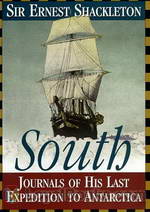 South! The Story of Shackleton's Last Expedition 1914-1917
South! The Story of Shackleton's Last Expedition 1914-1917
The expedition was given the grand title of The Imperial Trans-Antarctic Expedition. Due to be launched in 1914, two ships were to be employed. The first, the lead vessel, fittingly named the Endurance was to transport the team to the Weddell Sea from where the great explorer Ernest Shackleton and five others would cross the icy wastes of Antarctica on foot. The second ship, the Aurora was to approach the continent from the other side and put down supplies at various points to help the explorers... | |
By: Ernest Thompson Seton | |
|---|---|
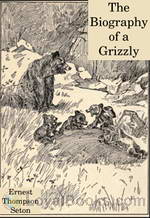 The Biography of a Grizzly
The Biography of a Grizzly
I first read this little book when I was in the fifth grade, and now more than fifty years later, I still find it fascinating. Ernest Thompson Seton was a man with a concern for nature her creatures and an excellent story teller. I could almost feel Wahb, the great grizzly’s pain and frustration as he tried to avoid contact with humans and just be left alone to carry out his bear business. Listening to this audio book will be an hour and a half well spent.Summary by Mike Vendetti, Narrator. | |
By: Ernest William Hornung (1866-1921) | |
|---|---|
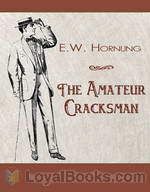 The Amateur Cracksman
The Amateur Cracksman
“I’d tasted blood, and it was all over with me. Why should I work when I could steal? Why settle down to some humdrum uncongenial billet, when excitement, romance, danger and a decent living were all going begging together” – A. J. Raffles, The Ides of March. | |
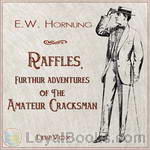 Raffles, Further Adventures of the Amateur Cracksman
Raffles, Further Adventures of the Amateur Cracksman
Raffles, Further Adventures of the Amateur Cracksman (also published as The Black Mask) is the second collection of stories in the Raffles series. After the dark turn of events at the end of The Gift of the Emperor, Bunny’s done his time and, his life not being quite what it was before, now finds himself longing for the companionship of his Raffles. | |
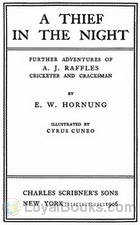 A Thief in the Night
A Thief in the Night
Gentleman thief A.J. Raffles burgles his way through a series of homes in late Victorian England. A Thief in the Night is a short story collection and Hornung's third book in the Raffles series. | |
 Mr. Justice Raffles
Mr. Justice Raffles
A. J. Raffles is a British gentleman thief of some renown who, in this, the hero's final adventure, ironically demonstrates a sense of morality by teaching a London East End loan shark a lesson. The book was later made into a movie, as well as a British television series. | |
By: Erskine Childers (1870-1922) | |
|---|---|
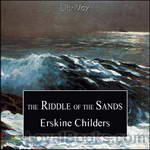 The Riddle of the Sands
The Riddle of the Sands
Containing many realistic details based on Childers’ own sailing trips along the German North Sea coast, the book is the retelling of a yachting expedition in the early 20th century combined with an adventurous spy story. It was one of the early invasion novels which predicted war with Germany and called for British preparedness. The plot involves the uncovering of secret German preparations for an invasion of the United Kingdom. It is often called the first modern spy novel, although others are as well, it was certainly very influential in the genre and for its time... | |
By: Ethel C. Pedley (1859-1898) | |
|---|---|
 Dot and the Kangaroo
Dot and the Kangaroo
Dot and the Kangaroo, written in 1899, is a children’s book by Ethel C. Pedley about a little girl named Dot who gets lost in the Australian outback and is eventually befriended by a kangaroo and several other marsupials. | |
By: Ethel Twycross Foster (1881-1963) | |
|---|---|
 Little Tales of the Desert
Little Tales of the Desert
A six year-old girl named Mary spends Christmas vacation with her parents in the Arizona desert of 1901 or thereabouts. | |
By: Eugène Sue (1804-1857) | |
|---|---|
 The Mysteries of Paris, Volume 1
The Mysteries of Paris, Volume 1
The Mysteries of Paris (French: Les Mystères de Paris) is a novel by Eugène Sue which was published serially in Journal des débats from June 19, 1842 until October 15, 1843. Les Mystères de Paris singlehandedly increased the circulation of Journal des débats. There has been lots of talk on the origins of the French novel of the 19th century: Stendhal, Balzac, Dumas, Gautier, Sand or Hugo. One often forgets Eugène Sue. Still, The Mysteries of Paris occupies a unique space in the birth of this... | |
By: Eva K. Betz (1897-1968) | |
|---|---|
 Knight of Molokai
Knight of Molokai
Hurricane! Volcano eruptions and fire! Leprosy! Nothing deterred Father Damien from doing the work to which he had been called. Outstandingly big and strong as a boy, he was notably kind as a young man. He needed all his strength and kindness when he went to live at the leper colony of Molokai.This children’s biography of Father Damien of Molokai was written by Eva K. Betz, a prolific Catholic writer of history and biography books for children. (Introduction from an original dust jacket and Maria Therese) | |
 Priest on Horseback - Father Farmer: 1720 - 1786
Priest on Horseback - Father Farmer: 1720 - 1786
A historical novel for children, which tells the story of several months in the life of the then famous Father Farmer, as he traveled a Mass circuit in Pre-Revolutionary, Colonial America. He faced much danger and and adventure, in order to provide the Mass and the Sacraments to Catholics who had not seen a priest in years.Father Farmer was a real life missionary priest during the 1700’s in what is now New England. In 1779 he was appointed as one of the first trustees of the University of Pennsylvania. He also had a reputation as a philosopher and astronomer in his time, and was a member of the American Philosophical Society. (Introduction by Maria Therese)No on-line text available. | |
By: Evans, A. J. (1889-1960) | |
|---|---|
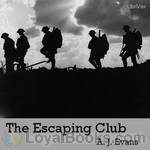 The Escaping Club
The Escaping Club
Described by some as one of the greatest escape books published. The Escaping Club recounts Evans' escape to Switzerland from a supposedly "escape-proof" German prison camp during World War I. After repatriation and rejoining the war, Evans again finds himself captured, this time first by Arabs and then by Turks. He again manages to escape. A detailed look at the trials faced by Allied POWs during World War I. | |
By: F. Marion Crawford | |
|---|---|
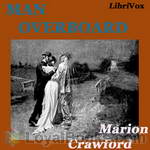 Man Overboard
Man Overboard
Peculiar happenings aboard the schooner Helen B. Jackson when one night during a storm, the small crew found themselves diminished by one. Somebody had gone overboard, and it was surmised that it was one of the twin Benton brothers. But oddly enough, it seemed that the ‘presence’ of the missing twin continued to exist on board during the following weeks. For example, one extra set of silverware was found to be used after each meal, but nobody claimed to be using them. What then did happen that stormy night, and which brother, if indeed it was one of the brothers, was the man who went overboard? | |
By: F. Tennyson Jesse (1888-1958) | |
|---|---|
 The Milky Way
The Milky Way
The Milky Way - F. Tennyson Jesse's first novel - began life as a 1913 magazine serial called The Adventures of Viv. In it, poor-but-plucky Cornish painter/model Vivian Lovel recounts events of her twenty-first year: en route from Penzance to London by steamer, she catches a baby dropped over the side of a sinking ship - and decides to keep it. Penniless, however, she "platonically" pairs up with pan-like fellow passenger Peter Whymperis, an actor and aspiring writer, and together they find work with a fifth-rate repertory troupe... | |
By: Ferdinand Schmidt (1816-1890) | |
|---|---|
 Gudrun
Gudrun
The charming story of “Gudrun” is a romance of the old heroic period, written by some unknown poet of Austria or Bavaria in the thirteenth century. Next to the "Nibelungen Lied," it is the most important of the German epic poems...The same elemental passions are depicted. The men are brave, vigorous heroes, rejoicing in battle and feats of prowess; the women are beautiful, constant, and courageous. There are many fine delineations of character in the original, as well as vigorous sketches of northern scenery... | |
By: Florence Finch Kelly (1859-1932) | |
|---|---|
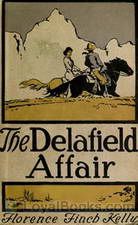 Delafield Affair
Delafield Affair
New Mexico's hot, dry winds are taking their toll: cattle suffer long treks to get food and water. But it is not just a hard time for them. Lucy Bancroft has sought a milder climate so she can recover from typhoid fever. She and her father stop to see Curt Conrad, a rancher, on their way to their new home. The two men discuss politics (some of it crooked) at the state level. they also talk about an easterner, a man named Delafield, who years earlier cheated Conrad's father out of his considerable wealth. Curt has vowed to seek revenge on Delafield if he can ever find the crook. thus begins a harrowing tale of determined search and blossoming love in the hot, dry climate of New Mexico. | |
By: Fr. Joseph Spillman (1842-1905) | |
|---|---|
 Shipwreck: A Story for the Young
Shipwreck: A Story for the Young
Willy Brown and his friend, Joseph, an orphan, are taken aboard the ship "St. George," but their wicked uncle plans a shipwreck onto a cannibal island. | |
By: Frances Hodgson Burnett (1849-1924) | |
|---|---|
 Haworth's
Haworth's
The story of an inventor's son, who tries to prevent him and a couple other characters from being taken into poverty by the man of the house who is drinking away the money, while trying to inherit their grandmother's money. - Summary by ej400 | |
By: Frances Trego Montgomery (1858-1925) | |
|---|---|
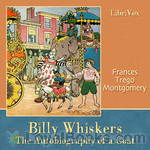 Billy Whiskers, the Autobiography of a Goat
Billy Whiskers, the Autobiography of a Goat
This delightful children's story can be enjoyed by kids and adults alike! A mischievous goat, Billy Whiskers, gets into trouble so often that the book could be named, "Billy Trouble Whiskers"! This humorous story will bring you many chuckles and give you a chance to get lost in Billy's adventures with childlike enthusiasm. From riding in a police car, to being a firehouse mascot, getting married, and finding himself a circus goat, Billy's adventures will certainly keep you entertained! (Introduction by Allyson Hester) | |
 Zip, the Adventures of a Frisky Fox Terrier
Zip, the Adventures of a Frisky Fox Terrier
Zip, a little fox terrier, lives in the town of Maplewood in the house of his owner, Dr. Elsworth. Each day when Dr. Elsworth drives his carriage to visit his patients, Zip goes along with him so that he can keep the doctor company and, most importantly, visit with the other animals in the town. Zip likes to find out all the latest news so that he can tell it to his best friend, Tabby the cat, who also lives with Dr. Elsworth. However, he also finds himself getting into mischief, whether it's trying to solve a burglary, sneaking fried chicken from a picnic, getting stuck in a stovepipe or fighting with Peter-Kins the monkey. Zip is one dog who never has a dull day. | |
 Billy Whiskers Jr.
Billy Whiskers Jr.
This is one of the early Billy Whiskers books where he bears the title, “Junior.” Billy jumps the fence on the farm and heads west for adventures with sheep, wolves, cowboys and Indians, and meets a dog named Stubby who becomes his companion on this and future adventures. - Summary by Larry Wilson | |
 Billy Whiskers in France
Billy Whiskers in France
Billy Whiskers is in France, but he is homesick. Of course, he makes new friends and entangles himself in many adventures. He has encounters with nurses, farmers, and a terrible wharf rat. Why is he at a dog cemetery? Why is there a submarine explosion? Join our favorite goat on his adventures in France. - Summary by Larry Wilson | |
 Billy Whiskers at Home
Billy Whiskers at Home
This is one in the beloved series of Billy Whisker books. a lovable goat whose adventures always entertain. Of course, adventure for Billy usually means trouble. From the Brazilian bullfight and butting contests to what happens on Thanksgiving Day, there is always laughter. We won’t even talk about the ginger cookies! But then, Billy can also be a hero, along with his cat and dog friends, Stubby and Button, who save a life. - Summary by Larry Wilson | |
 Billy Whiskers' Travels
Billy Whiskers' Travels
Running away from home is always bound to lead to adventures, some surprising and good and some not so pleasant. Follow Billy Whiskers when he encounters fireworks, tigers and dragons! Will this little goat ever get home again? - Summary by Larry Wilson | |
 Billy Whiskers at the Fair
Billy Whiskers at the Fair
Who doesn’t love a fair? Billy Whiskers, the mischievous goat sure does! When he leaves Cloverleaf farm his adventures take him to the laughing gallery, the balloon man, the pumpkin man and the fortune teller, and so much more. What does he do on his night with the Duke? - Summary by Larry Wilson | |
 Billy Whiskers Out for Fun
Billy Whiskers Out for Fun
What our mischievous goat, Billy Whiskers and his friends Stubby & Button, think is fun may not be so for everyone else. But, they are off for fun at the fair, in the barnyard, in town, the circus, and even at a bridal supper. Then, what happens with the burglar in the cellar? - Summary by Larry Wilson | |
 Dogs and Puppies
Dogs and Puppies
From the author of the popular "Billie Whiskers" books, comes this short collection of stories about --- well, dogs and puppies. Let's meet Gypsy, Pretty, Punch, Buster, Patsy, and Beans. - Summary by Larry Wilson | |
By: Francis Godwin (1562-1633) | |
|---|---|
 The Man in the Moone
The Man in the Moone
A self-serving Spaniard discovers a means of traveling to the moon, describing his sensations in transit in terms remarkably consistent with modern astronauts' experiences. He finds on the moon a utopia, which he describes in detail, but being a fallen creature, he takes the first opportunity of coming home. ( | |
By: Francis J. Finn, S.J. (1859-1928) | |
|---|---|
 Harry Dee; or Making it Out
Harry Dee; or Making it Out
Harry Dee, a nervous, sensitive boy, given to somnambulism, arrives at St. Maure's following his experiences involving the murder of his rich uncle. Tom Playfair and Percy Wynn help to restore Harry to his former self, which includes solving "The Mystery of Tower Hill Mansion." This is the last book of the three of Fr. Finn's famous trio. | |
By: Francis Lovell Coombs | |
|---|---|
 The Young Railroaders
The Young Railroaders
While aimed at youths, this series of tales of the just-opening West makes a rollicking good story for adults, too. Three teen-age boys, trained as telegraphers, manage to get themselves in and out of a wide variety of harrowing circumstances. Using their knowledge of Morse code, the science of telegraphs, and the operation of railroads, the boys stir in native resourcefulness, quick-thinking, and when the occasion demands it, raw courage – to effect rescues, thwart thieves, and solve mysteries. If Tom Swift had lived in the nineteenth century, he could not have had more exciting escapades! | |
By: Francis Parkman | |
|---|---|
 Pioneers of France in the New World
Pioneers of France in the New World
Francis Parkman (1823-1893) has been hailed as one of America’s first great historians and as a master of narrative history. Numerous translations have spread the books around the world. The American writer and literary critic Edmund Wilson (1895-1972) in his book O Canada (1965), described Parkman’s France and England in North America in these terms: The clarity, the momentum and the color of the first volumes of Parkman’s narrative are among the most brilliant achievements of the writing of history as an art... | |
 The Jesuits in North America in the 17th Century
The Jesuits in North America in the 17th Century
Parkman has been hailed as one of America's first great historians and as a master of narrative history. Numerous translations have spread the books around the world. The American writer and literary critic Edmund Wilson (1895-1972) in his book "O Canada" (1965), described Parkman’s France and England in North America in these terms: "The clarity, the momentum and the color of the first volumes of Parkman’s narrative are among the most brilliant achievements of the writing of history as an art... | |
By: Francis Parkman, Jr. | |
|---|---|
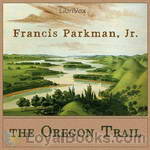 The Oregon Trail
The Oregon Trail
The book is a breezy, first-person account of a 2 month summer tour of the U.S. states of Nebraska, Wyoming, Colorado, and Kansas when Parkman was 23. Proofed and produced by Karen Merline. | |
By: Francis Robert Goulding (1810-1881) | |
|---|---|
 Young Marooners on the Florida Coast
Young Marooners on the Florida Coast
When Robert, Harold, Mary and Frank are cast ashore on a deserted island, they must learn to live off the land in order to survive. With dangerous wildcats, friendly bear cubs, sunken pirate treasure and more, life on the island is never dull - but will they ever see their family again?Although it is now over a century and a half old, this tale of children fending for themselves possesses all the elements of enduring popularity. It has the strength and vigor of simplicity; its narrative flows continuously forward; its incidents are strange and thrilling, and underneath all is a moral purpose sanely put. - Summary by MaxineMarie & SweetPea | |
By: Francis Rolt-Wheeler (1876-1960) | |
|---|---|
 The Boy With the U. S. Fisheries
The Boy With the U. S. Fisheries
| |
By: Frank Benton (1853-1921) | |
|---|---|
 Cowboy Life on the Sidetrack
Cowboy Life on the Sidetrack
Frank Benton, himself a wealthy rancher, provides a series of first-hand sketches of cowboy life of the late 19th and early 20th century from stories gathered from the "sidetrack." These were working cowpunchers with a subculture of their own who did the day-to-day work of the ranches. This is an important part of American history preserved for us in these stories. - Summary by Larry Wilson | |
By: Frank Gee Patchin | |
|---|---|
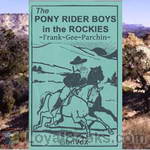 The Pony Rider Boys in the Rockies
The Pony Rider Boys in the Rockies
The Pony Rider Boys in the Rockies is the first book in the 12 part series by Frank Gee Patchin. | |
 The Pony Rider Boys in Texas
The Pony Rider Boys in Texas
Yee-hawww! The Pony Rider Boys are on the trail again! In the second book of this series, Professor Zepplin has taken the young men to San Diego, Texas, to experience the life of a cowboy. The cattle drive will take them across the great state of Texas, where they will meet many dangers and adventures. | |
 The Pony Rider Boys in Montana
The Pony Rider Boys in Montana
Yee-Haaw! The Pony Rider Boys are on the move again! In this book, the 3rd of the series, the boys have decided that they want to explore the north country. They also want to make their own arrangements for the adventure, with the approval of Professor Zepplin, of course! So they have arrived in Forsythe, Montana, to try their luck in the mountains. | |
 Pony Rider Boys in Alaska
Pony Rider Boys in Alaska
Yee-haw!! The Pony Riders Boys are on the move again! In their last adventure, they are on their way with Professor Zepplin to Alaska. On the "Corsair", they see gold miners on their way to seek their fortune, so the Pony Rider Boys decide to join in the hunt for the yellow metal. But, as always, trouble is not far behind the Pony Rider Boys! (Ann Boulais ) | |
 Pony Rider Boys in New Mexico
Pony Rider Boys in New Mexico
Yee-Haw!! The Pony Rider Boys are on the move again! This time they are on their way to Bluewater, New Mexico, ready for whatever adventure they can find. But this time, trouble spots them on the train. Will the Pony Rider Boys be able to handle whatever comes their way? | |
 Pony Rider Boys with the Texas Rangers
Pony Rider Boys with the Texas Rangers
Yee-Haw!! The Pony Rider Boys are on the move again. This time the boys at Delaware Creek, dead in their saddles. They had been riding long and hard into Texas, looking forward to their next adventure. But, trouble finds them once again, this time Stacy Brown may have been shot! What will happen next is anyone's guess. Previous book in the series: The Pony Rider Boys in Grand Canyon Next book in the series: The Pony Rider Boys on the Blue Ridge | |
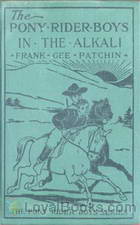 Pony Rider Boys in the Alkali
Pony Rider Boys in the Alkali
Yee-Haww! The Pony Rider Boys are on the move again! This time the boys are in the desert of Nevada, discovering the beauty and perils in 100 degree heat. It should be another thrilling ride that Professor Zepplin has taken them on! | |
 Pony Rider Boys in the Grand Canyon
Pony Rider Boys in the Grand Canyon
Yee-Haaww! The Pony Rider Boys are on the move again. The boys are back home, but as they are chopping wood, it is decided that they need a new adventure out west. Mr. Perkin's, Walter's dad, has suggested the Grand Canyon. So, meeting Professor Zepplin on the way, they set out on the train for Arizona. Previous book in the series: The Pony Rider Boys in New Mexico Next book in the series: The Pony Rider Boys with the Texas Rangers | |
 Pony Rider Boys in the Ozarks
Pony Rider Boys in the Ozarks
Yee-Haw!! The Pony Rider Boys are on the move again! This time the boys are in the Ozark Mountains in Missouri. With Joe Hawk, or Eagle-eye, guiding them, Professor Zepplin and the Pony Rider Boys are sure to find many adventures in this action-packed, fourth book of this series by Frank Gee Patchin. | |
 Pony Rider Boys in Louisiana
Pony Rider Boys in Louisiana
Yee-haw! The Pony Rider Boys are on the move again! This time the boys are headed to the canebrakes in the swamps of Louisiana. Of course trouble follows our friends into the swamp, but Chunky will surprise everyone in this book. Previous book in the series: The Pony Rider Boys in New England Next book in the series: The Pony Rider Boys in Alaska | |
 Pony Rider Boys on the Blue Ridge
Pony Rider Boys on the Blue Ridge
Yee-Haw! The Pony Rider Boys are on the move again. This time our friends are in the Carolina Mountains, battling the weather and bullies. But Tad proves how valuable and resourceful he truly is! Previous book in the series: The Pony Rider Boys with the Texas Rangers Next book in the series: The Pony Rider Boys in New England | |
 Pony Rider Boys in New England
Pony Rider Boys in New England
Yee-Haw! The Pony Rider Boys are on the trail again! This time the boys are doing something a little different. Instead of heading west to the wide open spaces, they are riding east to the Wilderness of Maine. But, as always, trouble finds the boys, in both the four-legged and two-legged form! Will they make it back out of the wilderness? | |
By: Frank H. Spearman (1859-1937) | |
|---|---|
 Nan of Music Mountain
Nan of Music Mountain
| |
By: Frank L. Packard (1877-1942) | |
|---|---|
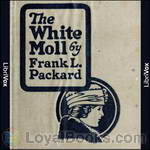 The White Moll
The White Moll
Frank Lucius Packard (February 2, 1877 – February 17, 1942) born in Montreal, Quebec, was a Canadian novelist. Packard is credited with bridging the gap from the “cozy” style mysteries to the more gritty, hard-boiled style of such writers as Dashiell Hammet and Raymond Chandler. Packard also wrote a series of novels, beginning in 1917, featuring Jimmie Dale. A wealthy playboy by day, at night, Jimmie becomes a crimefighter “The Gray Seal” complete with mask and secret hide-out, “The Sanctuary”... | |
By: Frank Norris (1870-1902) | |
|---|---|
 Moran of the Lady Letty
Moran of the Lady Letty
| |
By: Frank Pinkerton | |
|---|---|
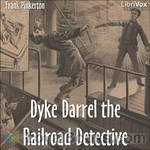 Dyke Darrel the Railroad Detective
Dyke Darrel the Railroad Detective
Dyke Darrel investigates an audacious train robbery that included the murder of a friend, and embarks on a man-hunt. High Victorian serial melodrama at its best! | |
By: Frank Richard Stockton (1834-1902) | |
|---|---|
 A Jolly Fellowship
A Jolly Fellowship
| |
By: Frank Tousey (1853-1902) | |
|---|---|
 Fame and Fortune Weekly No. 6: Building a Railroad
Fame and Fortune Weekly No. 6: Building a Railroad
Don and Gil Winthrop inherited their father's business to construct a railroad in a developing location in upstate New York. Engineers themselves, though young, they decided to carry on his work despite their inexperience. They have to fight their way through troubles instigated by a competing contractor, and a vindictive foreman of his who holds a dark secret of his own. | |
 Fame and Fortune Weekly No 7 Winning His Way
Fame and Fortune Weekly No 7 Winning His Way
The recent death of Frank Morris' father, Owner and Editor of the Green River Argus, has left his 18 year-old son, Frank to take up the challenge of running the paper. In the months preceding his death, Frank's father had hired a man, Mr. Jebb, to run the paper in his absence. Unfortunately Mr. Jebb had purposefully mishandled the paper to diminish its value so the local powerhead, Squire Roach, could purchase it at a bargain. Now Frank needs his wits, ingenuity, and salesmanship to help the Argus to regain its stature in the community. | |
By: Frank V. Webster | |
|---|---|
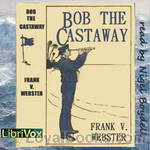 Bob the Castaway
Bob the Castaway
Frank V Webster was a pseudonym controlled by the Stratemeyer Syndicate, the first book packager of books aimed at children. This pseudonym was used on books for boys from the early 1900s through the 1930s.Bob the Castaway follows the antics of young prankster Bob Henderson, his parents futile attempts to get him to mend his ways, and his subsequent nautical adventures. (Introduction by Nigel Boydell) | |
By: Fred M. White (1859-1935) | |
|---|---|
 Doom of London
Doom of London
Here are six stories, each one describing a disaster afflicting London, that were popularly serialized during 1903-1904 in Pearson’s Magazine. The tales depict a deep freeze and unprecedented snowfall; a heavy, blinding, paralyzing blanket of fog; a widespread killer virus; a fraudulent scheme causing financial panic; a minor electrical accident in a tunnel that spirals into catastrophe; and most of the city’s water supply, reportedly contaminated with deadly bubonic bacillus, puts the population in great fear of plague. Is the word “doom” in the book's title accurate, or is it just hyperbole? | |
 Mystery of the Ravenspurs
Mystery of the Ravenspurs
The Ravenspurs have for generations resided quietly in prosperity and comfort at their seaside castle. But the clan is suddenly besieged with strange happenings which are dwindling the population of the family to only a few which remain, and those few find themselves in fear of becoming the very last of the powerful family if the cause of their untimely deaths and disappearances is not uncovered soon. It will take a great deal of detective work and a touch of travel to help unravel the mystery of the Ravenspurs. | |
By: Frederic Stewart Isham (1866-1922) | |
|---|---|
 Under the Rose
Under the Rose
| |
By: Frederick Ferdinand Moore (1877-) | |
|---|---|
 The Devil's Admiral
The Devil's Admiral
| |
By: Frederick Marryat (1792-1848) | |
|---|---|
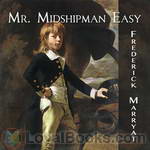 Mr. Midshipman Easy
Mr. Midshipman Easy
One of the first novel-length pieces of nautical fiction, MR. MIDSHIPMAN EASY (1836) is a funny and easygoing account of the adventures of Jack Easy, a son of privilege who joins the Royal Navy. The work begins as a satire on Jack’s attachment to “the rights of man” that may try the listener’s patience. But despair not, for the story soon settles down as the philosophical midshipman begins his many triumphs over bullies, foul weather, and various damned foreigners of murderous intent.Caveat audiens: This novel employs racial/ethnic epithets and religious stereotypes, as well as taking a rather sunny view of supply-side economics... | |
 Masterman Ready The Wreck of the "Pacific"
Masterman Ready The Wreck of the "Pacific"
| |
 The Mission; or Scenes in Africa
The Mission; or Scenes in Africa
| |
 The Pacha of Many Tales
The Pacha of Many Tales
| |
 Snarleyyow
Snarleyyow
This is a quite amusing nautical tale of the British Navy of the around the year 1700. While, as with much early 'humor', it is somewhat heavy-handed, the sympathies of the author are clear and good, and cruelty is often averted by good fortune or background characters. First published under the title 'The Dog Fiend', the primary characters are an evil captain of a cutter and his dog. The dog seems indestructible, as is the poor cabin boy who is the butt of the captain's ill humor, and who often is chewed on by the dog... | |
 Travels and Adventures of Monsieur Violet
Travels and Adventures of Monsieur Violet
| |
 Masterman Ready
Masterman Ready
| |
 The Travels and Adventures of Monsieur Violet in California, Sonora, and Western Texas
The Travels and Adventures of Monsieur Violet in California, Sonora, and Western Texas
| |
 The Pacha of Many Tales
The Pacha of Many Tales
| |
 The Mission
The Mission
| |
By: Frederick O. Bartlett (1876-1945) | |
|---|---|
 The Web of the Golden Spider
The Web of the Golden Spider
The Web of the Golden Spider is a tale of mystery, intrigue and adventure that begins in the city, progresses to a mutinous open sea voyage, eventually leading to the remotest areas on the slopes of the Andes of South America. Wilson, our hero, finds himself in the midst of a battle between a deposed queen and revolutionists who have banded together in an effort to bring their country together as a republic. Wilson, although torn between helping mercenaries, freedom fighters and revolutionaries, is more concerned with the rescuing of the girl he has fallen in love with, but who has been snatched from him by a mysterious priest... | |
By: Frederick Thomas Jane (1865-1916) | |
|---|---|
 Blake of the "Rattlesnake"
Blake of the "Rattlesnake"
Fred Jane, who later went on to publish his famous "Jane's Fighting Ships", doubtless was noting the success of other books that forecast a British defeat in the event of war in the late 19th century when he wrote this fictional account of "The Man Who Saved England." Jane tells of a possible war against both France and Russia with plenty of verve and derring-do amid naval battles, both small and large. - Summary by Mark | |
By: Frederik Pohl (1919-2013) | |
|---|---|
 Plague of Pythons
Plague of Pythons
In a post-apocalyptic world where every government in the world has been overrun by its own military machinery, only to see that military machinery self-destruct, people are randomly being affected by a plague that seemingly takes over their brains and forces them to commit heinous crimes. Chandler is one of these unfortunate victims, the perpetrator of rape and murder. He is driven out of his community as a Hoaxer , branded on his forehead with the letter H. But he is not feigning. In his travels, he finds the source of the plague, and it's not what people think. It's up to him to deal with it, and he does. But to what end? - Summary by Nick Bulka | |
By: Fridtjof Nansen (1861-1930) | |
|---|---|
 Farthest North
Farthest North
Being the Record of a Voyage of Exploration of the Ship "Fram", 1893-96 and of a Fifteen Months' Sleigh Journey by Dr. Nansen and Lieut. Johansen / by Fridtjof Nansen; with an Appendix by Otto Sverdrup | |
By: Friedrich Trenck (1726-1794) | |
|---|---|
 The Life and Adventures of Baron Trenck, Volume 1
The Life and Adventures of Baron Trenck, Volume 1
| |
 The Life and Adventures of Baron Trenck, Volume 2
The Life and Adventures of Baron Trenck, Volume 2
| |
By: G. A. Henty (1832-1902) | |
|---|---|
 Tales from the Works of G.A.Henty
Tales from the Works of G.A.Henty
George Alfred Henty was an English newspaper correspondent who became a prolific author of, predominantly, adventure stories for boys. Most were based on true historical events. In this volume, published posthumously, we are presented with thirteen signature stories taken from within his novels. We are taken to India, to Canada, aboard a plague ship and back to Hannibal's army. We confront the Chinese, the Black Death and numerous brushes with death in these gripping tales, which give us a taste of Henty's storytelling mastery. - Summary by Lynne Thompson | |
 In the Hands of the Cave-Dwellers
In the Hands of the Cave-Dwellers
In the Hands of the Cave-Dwellers is a classic adventure where the hero is an American sailor who saves a young Mexican from thugs. The story spreads to an Indian attack, the loss of the heroine to cave dwellers, her rescue, and the eventual happiness of hero and heroine who have overcome adversity. - Summary by Publisher | |
By: G. K. Chesterton (1874-1936) | |
|---|---|
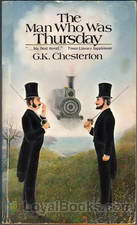 The Man Who was Thursday
The Man Who was Thursday
Two poets in a London park at sunset, debating on the attributes of poetry and whether it's really a metaphor for anarchy. A group that meets in secret, planning to overthrow the world order. Disguises and deceptions, ideals and ideology. A medley of themes and genres makes this a great read for anyone who's a fan of Chesterton and his iconic Father Brown. The Man Who Was Thursday includes Chesterton's favorite theme of Christianity with touches of delightful humor to enliven the twists and turns that abound throughout the book... | |
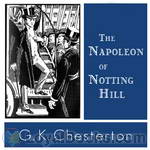 The Napoleon of Notting Hill
The Napoleon of Notting Hill
While the novel is humorous (one instance has the King sitting on top of an omnibus and speaking to it as to a horse: “Forward, my beauty, my Arab,” he said, patting the omnibus encouragingly, “fleetest of all thy bounding tribe”), it is also an adventure story: Chesterton is not afraid to let blood be drawn in his battles, fought with sword and halberd in the London streets, and Wayne thinks up a few ingenious strategies; and, finally, the novel is philosophical, considering the value of one man’s actions and the virtue of respect for one’s enemies. | |
 The Trees of Pride
The Trees of Pride
Three trees, known as the Peacock trees, are blamed by the peasants for the fever that has killed many. Squire Vane scoffs at this legend as superstition. To prove them wrong, once and for all, he takes a bet to spend the night in the trees. In the morning he has vanished. Is he dead, and if so who has killed him? The poet? The lawyer? The woodsman? The trees? | |
By: Gaylord Dubois (1899-1993) | |
|---|---|
 Barry Blake Of The Flying Fortress
Barry Blake Of The Flying Fortress
Gaylord DuBois wrote juvenile literature for decades. This is a boys' adventure story about serving in the American World War II flying corps. | |
By: Gen. George A. Custer (1839-1876) | |
|---|---|
 My Life on the Plains
My Life on the Plains
George Armstrong Custer (December 5, 1839 – June 25, 1876), one of the most mythologized figures in American history, was an United States Army officer and cavalry commander in the American Civil War and the Indian Wars. He eventually met his fate in the battle of Little Big Horn in one of the most notable defeats of American armed forces.My Life on the Plains is an autobiographical first-hand account of the Indian Wars of 1867-1869, detailing the winter campaign of 1868 in which Custer led the 7th US cavalry against the Cheyenne Indians... | |
By: Gene Stratton-Porter (1863-1924) | |
|---|---|
 Her Father's Daughter
Her Father's Daughter
| |
By: George Alfred Henty | |
|---|---|
 The Cat of Bubastes
The Cat of Bubastes
G.A. Henty’s “tale of ancient Egypt” tells the story of Amuba, prince of the Rebu, who is taken captive when his people are conquered by the Egyptians, and then becomes the servant and companion of Chebron, son of the high priest of Osiris. A mystery unfolds as the lads find evidence of a murderous conspiracy within the ranks of the priesthood; but they must then flee for their lives when they unintentionally kill the cat selected as the successor to the Cat of Bubastes, one of the most sacred animals of Egypt. Amuba and Chebron are strong, courageous, and resourceful – but will this be enough to carry them beyond the long reach of the power of Egypt? | |
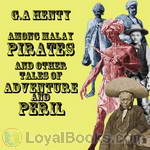 Among Malay Pirates and Other Tales of Peril and Adventure
Among Malay Pirates and Other Tales of Peril and Adventure
G. A . Henty was a prolific writer of historical fiction for young adults. In this collection of shorter stories we visit Malay pirates, have a couple of tales of India, a shipwreck off the Channel Islands and a bursting dam in California, and finish off escaping from captivity in China | |
 True to the Old Flag
True to the Old Flag
This book tells the story of the American war of Independence from the side of the British. The old flag mentioned in the title is the flag of England. This is a book for young readers, but - as a good book should be - everybody can enjoy it". | |
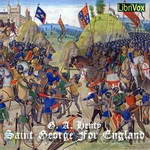 St George for England
St George for England
A tale set in England in the time of Cressy and Pointiers. A child of noble birth whose parents have fallen foul of the current royalty is taken by his dying mother and placed in hiding. He grows up with a bowyer and then apprenticed to an armourer just outside the gates of the City of London, becomes accomplished in arms and joins the campaign in France.A tale of heroism and 14th century viciousness. Great fun. | |
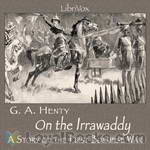 On the Irrawaddy, A Story of the First Burmese War(1897)
On the Irrawaddy, A Story of the First Burmese War(1897)
With the exception of the terrible retreat from Afghanistan, none of England's many little wars have been so fatal--in proportion to the number of those engaged--as our first expedition to Burma. It was undertaken without any due comprehension of the difficulties to be encountered, from the effects of climate and the deficiency of transport; the power, and still more the obstinacy and arrogance of the court of Ava were altogether underrated; and it was considered that our possession of her ports would assuredly bring the enemy, who had wantonly forced the struggle upon us, to submission... | |
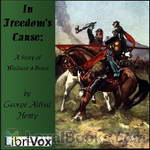 In Freedom's Cause
In Freedom's Cause
Another stirring tale from the master of historical fiction set in the time of Robert Bruce and William Wallace and their struggle for Scotland's independence. | |
 With Frederick The Great: A Story of the Seven Years' War
With Frederick The Great: A Story of the Seven Years' War
Among the great wars of history there are few, if any, instances of so long and successfully sustained a struggle, against enormous odds, as that of the Seven Years' War, maintained by Prussia--then a small and comparatively insignificant kingdom--against Russia, Austria, and France simultaneously, who were aided also by the forces of most of the minor principalities of Germany. The population of Prussia was not more than five millions, while that of the Allies considerably exceeded a hundred millions... | |
 With Clive in India
With Clive in India
With Clive in India gives a vivid picture of the wonderful events of the ten years, which at their commencement saw Madras in the hands of the French--Calcutta at the mercy of the Nabob of Bengal--and English influence apparently at the point of extinction in India--and which ended in the final triumph of the English, both in Bengal and Madras. There were yet great battles to be fought, great efforts to be made, before the vast Empire of India fell altogether into British hands; but these were but the sequel of the events described. | |
 Under Drake's Flag: A Tale Of The Spanish Main
Under Drake's Flag: A Tale Of The Spanish Main
An exciting tale set on the high seas, in a period ruled by exploration, with the ever-present dangers of nature and the weather, together with pirates of the famed Spanish Main. | |
 At the Point of the Bayonet: A Tale of the Mahratta War
At the Point of the Bayonet: A Tale of the Mahratta War
The story of the war in which the power of the great Mahratta confederacy was broken ended in the firm establishment of the British Empire the Indian Peninsula. When the struggle began, the Mahrattas were masters of no small portion of India; their territory comprising the whole country between Bombay and Delhi, and stretching down from Rajputana to Allahabad; while in the south they were lords of the district of Cuttack, thereby separating Madras from Calcutta. The jealousies of the great Mahratta... | |